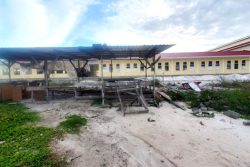Recently, the leadership of APNU has been coming in for some all-round battering, largely I believe because it has not developed and/or has not been able to transmit an acceptable vision of the future, and its political antics have left many confused and with the belief that the party is comfortable with its new parliamentary stature. This may not be the case but politics is about perceptions and there is little doubt that this is the widespread perception of APNU today.
I have argued ad nauseam in this column that having a written vision is important for many reasons, not least in that it helps stakeholders to act innovatively and in concert, even when faced with apparently unique situations. But in the absence of such documentation one’s general trajectory is normally deduced from one’s actions and this is precisely where APNU baffles.
 It is not difficult to comprehend the general political orientation of the PPP/C. While perhaps aspirational, all its talk about its commitment to the development of Guyana and our living cooperatively together is secondary and simply used as the higher moral foundation upon which its practical political designs are based.
It is not difficult to comprehend the general political orientation of the PPP/C. While perhaps aspirational, all its talk about its commitment to the development of Guyana and our living cooperatively together is secondary and simply used as the higher moral foundation upon which its practical political designs are based.
Given the nature of our constitution, which gives the party with the highest multiple at the general election the executive, PPP/C views, one or two electoral terms of the present political turmoil, as not impossible to achieve or particularly unacceptable. The party is playing for time: to sanitise and make questionable events of the past fait accompli; to allow sufficient space for people to forgive and forget; to create political chaos that will frustrate the public and the opposition to a point where the former (particularly that component consisting of its traditional supporters) becomes wary and begins to see the PPP/C as the only viable alternative and the latter begins to make politically helpful errors. Had the events at Linden got out of hand it would have been a boon for the party.
From my point of view, this is not an untenable strategy for a party that has been in power for two decades and has lost and appears to be still losing vital support. However, the very fact that makes such an effort possible also makes it difficult to achieve. It is possible because of our historic racial voting patterns but difficult because of the changing demographics contained in that pattern and the near impossibility of the PPP/C, after twenty years of failing to do so, being able to attract significant votes from the other major constituencies.
The AFC vision too appears pretty simple and any independent analysis as it relates to opposition politics must conclude that the AFC comes over as more focused, clearheaded and as the party taking the fight to the PPP/C. On many important issues its position is less ambiguous. For example, on the Anti-Money Laundering and Countering the Financing of Terrorism (Amendment) Bill its hard-ball, linked, political approach comes over as much more understandable and appealing than the compromising position taken by APNU. Politics is about compromise and when a party does not have the votes as the PPP/C does not, as we see daily in US politics, it has to compromise: “story done.”
The AFC is attempting to turn Guyana into a multiparty society in which the two major groups do not dominate and this is another appealing aspect of its approach. However, it faces the common problem faced by all third parties in our kinds of divided society. Today, one of the ethnic groups, having become alienated from its leaders, will give support only to return to their traditional pattern of voting the next day. What is the bane of the AFC is the salvation of the PPP/C!
APNU is disappointing many. I have already made reference to the party’s amorphous position on the Anti-Money Laundering Bill and there are many other issues that give cause for concern. Why waste time proposing a motion to clean up Georgetown, knowing full well that if the PPP/C wanted the city to run better it would have ensured that it did a long time ago? No wonder cynics believe that this was intended as a ruse to send a positive message to the party’s urban supporters. However, it was also a clear indication of the party’s reliance upon and the poverty of its parliamentarianism!
If APNU is uncomfortable with the current acting chancellor and the chief justice it should develop and place its rationale for being so on the table. Why take a stance that appears to run counter to the historic position of the core group that constitute APNU and now concedes that one can be acting in a position for years and not be substantively appointed. Furthermore, APNU’s position leaves those officials questioning the validity of their staying in office when a major stakeholder, who must agree with their staying in their position, believes it is possible to find better people! Perhaps the latter was the intention but need it have been done at the sacrifice of one’s constituency?
But even more disturbingly, the president invites the parties to consultations to avoid future political gridlock. Given the political direction of the AFC, which is to show the PPP/C as corrupt, incompetent, unresponsive, etc, that party took a list of concerns to the PPP/C, the latter’s negation of which demonstrated in no uncertain terms the points that the AFC wanted to make.
APNU claims that taking a list was irrelevant since the PPP/C would have, as it did, dismissed it. But what did APNU, a party that is committed to shared governance, do but say that they “discussed the long-term development of the country and the role of the various political parties.” In this context, if the press is correct, the party’s position was that what Guyana needs is more “inclusionary … and more consultative” governance! No wonder the AFC scored a major propaganda coup on the APNU, which no amount of obfuscation about the irrelevance of a list could hide.
Guyana’s problem is not a lack of consultation but the fact that it has a governance model that permanently locks one group out of government. Regardless of how the PPP/C reacts, executive shared governance should be permanently on the table and propagated to supporters and all Guyanese as a progressive way forward.







